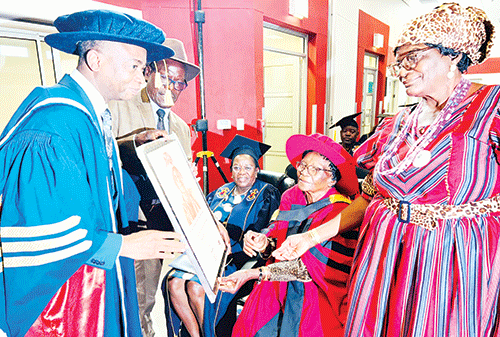EENHANA – Ohamba of Oukwanyama Martha Mwadinomho Nelumbu is not your typical queen.
While most royals typically fold their arms to be served by their subjects, she has, for most of her life, rolled up her sleeves and worked with society shoulder-to-shoulder, making herself a resource to care for others. Whether in pre- or post-independence Namibia, Nelumbu’s contribution over the years is there for all to see.
Her immaculate and selfless contribution is etched in a citation by the Namibia University of Science and Technology (Nust), in which they explain their recent decision to confer her with an honorary doctorate.
As humble as ever, Nelumbu has urged universities to strengthen and pay special attention to the teaching of life skills to create responsible societies.
She made these remarks while receiving an honorary doctorate [Honoris Causa Doctor of Philosophy] in Leadership and Change Management from Nust last Friday.
“It is important that young people attain higher-level life skills to enable them to live harmoniously with other members of society. I believe life skills will promote tolerance for the different views of fellow men and women,” Nelumbu implored.
Driving her point home, she said young people should be taught life skills geared towards the promotion of peace, ethical behaviour in daily life and love for one another.
Speaking at the special ceremony, Nust vice chancellor Erold Naomab said, like other universities, Nust has an academic tradition of awarding honorary doctorates to recognise distinguished personalities for their exceptional contributions to humanity.
“The honorary degree is attributed to Meeekulu Nelumbu’s leadership achievements, which are widely acclaimed,” said Naomab.
Agreeing with Naomab, Nust executive dean for the faculty of commerce, human sciences and education Efigenia Semente said the queen’s sacrifices and leadership ability are widely acclaimed.
Semente pointed to Nelumbu’s selfless involvement in addressing cyclical vulnerabilities and development challenges, such as poverty, food insecurity, natural hazards, gender inequality and macroeconomic shocks.
“Mwadinomho serves as a role model for the entire Ovakwanyama community and beyond, as she encourages charity, volunteering and active citizenship,” said Semente.
Over the years, Semente stated that, through Nelumbu’s directive and support, the Omhedi Palace cares for over 45 abandoned children and about 27 homeless adults.
Nelumbu also made a call in September 2015 to all young women in Namibia not to illegally abort, kill or abandon their babies but to bring them to the palace.
“She successfully initiated the establishment of a kindergarten on the Omhendi premises to cater for the orphans and abandoned children under her care at the Palace, as well as other children in the immediate neighbourhoods,” he said.
Selfless
Today, the kindergarten accommodates 41 children, aged between four and six years.
Further narrating Nelumbu’s distinguished contribution to Namibia’s liberation struggle, Semente said the queen assisted members of the People’s Liberation Army of Namibia by providing them with basic needs, such as food, water and shelter, as well as tipping them off with intelligence about the enemy at a time when it was neither fashionable nor safe to do so.
“Mwadinomho, as a grass-roots leader for the Namibian nation, has demonstrated her dedication and willingness to selflessly support Namibians in resolving the many vulnerabilities and weaknesses in Namibian society through charity, volunteering and active citizenship, thus advancing in no less degree the course of humanity,” he noted.
He then said, as a nation, they are convinced and proud of Ohamba’s achievements; they are honouring her – not only as a traditional leader but indeed as a national icon for an outstanding career achievement.
“In pursuit of this initiative, a steering committee was established. In June 2016, after the queen met with [the late] president Hage Geingob and minister of higher education Iita-Kandjii Murangi, they suggested a university be established in the area. This was a welcome move, since what Mwadinomho aspired for was a higher learning education institution to be brought closer to the people,’’ recalled Semente.
At the time, it was apparent it mattered less to the queen if it was going to be a full-blown university from the ground up or an extension of the existing ones.
“That was the birth of the Eenhana Satellite Campus of the Namibia University of Science and Technology. With the establishment of the Nust Eenhana Campus, Mwadinomho’s ultimate wish is that the campus grows, expands in size and extends the education services to the people in remote rural areas and other regions in the country so that people in remote areas can empower themselves through access to quality higher education,” Semente continued.
Royal family
Martha Mwadinomho ya Kristian Nelumbu, the Ohamba of the Oukwanyama Traditional Authority, was born into the family of the Eehamba of Oukwanyama at Oifidi village west of Ondjiva in Angola on 7 August 1931.
Her mother, Nekoto ya Shigeya, was a daughter of Nahango ya Mboliooli.
From the maternal lineage, Ohamba is Omukwanangobe (totem of the cattle) and from the paternal lineage, she is Omukwaudimbe (totem of the millet).
She lived in Oongo for only a short time.
Her aunt Kaleinasho Ndeiweda, the Ohamba yo Koshihambo, and Mandume’s niece took her under their care when she was just a toddler.
However, she did not live there for long – just probably ten years, and then her aunt passed away.
After Kaleinasho’s death, she was then adopted by Vilho Weyulu, an uncle who brought her to the Namibian side of the border at Ohaingu, where she grew up.
Ohamba Mwadinomho says she came to Ohaingu during World War II – and at that time, it was regarded as Adolf Hitler’s war in the early 1940s.
– vkaapanda@nepc.com.na
(Queen)
Caption:



